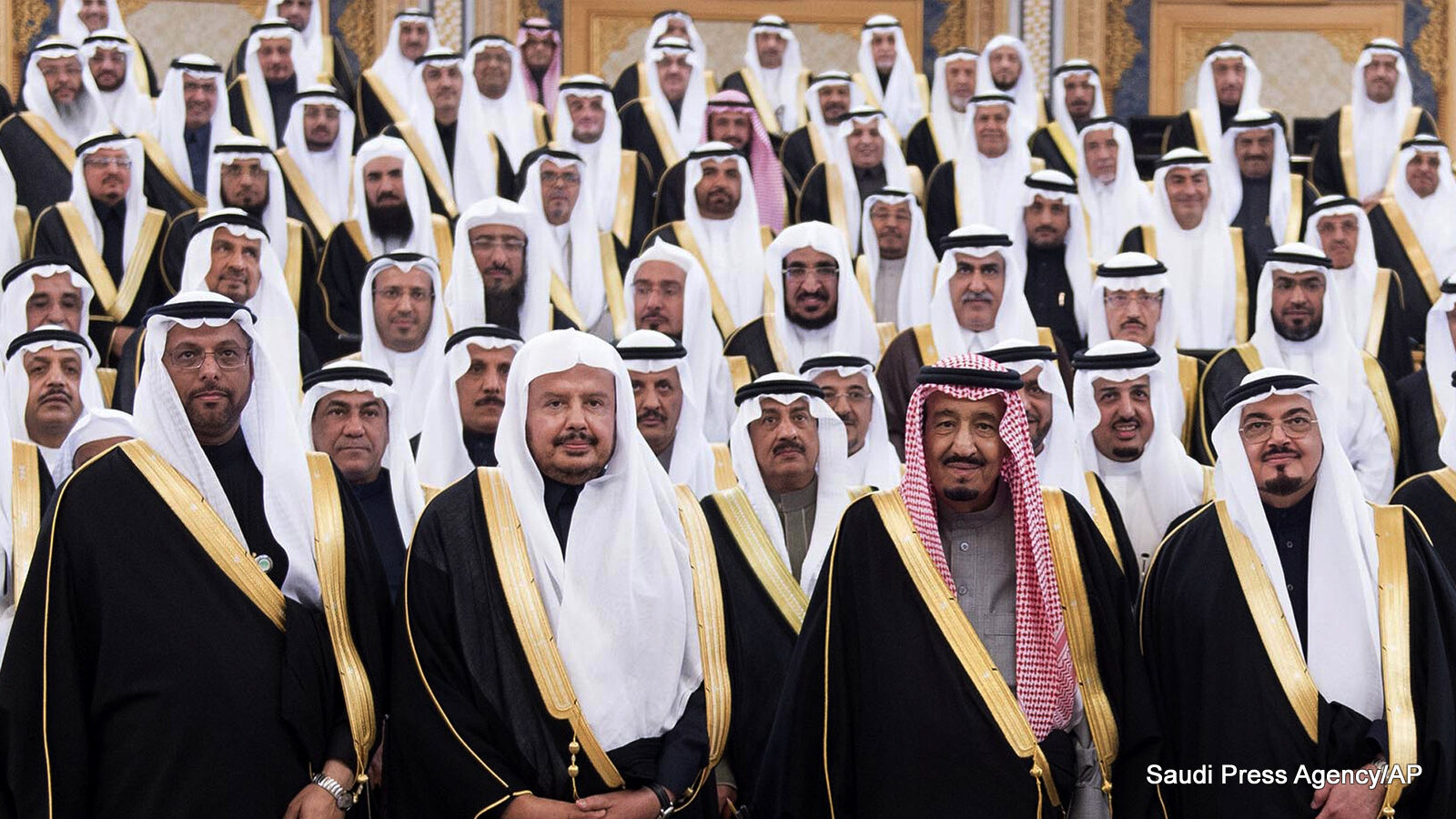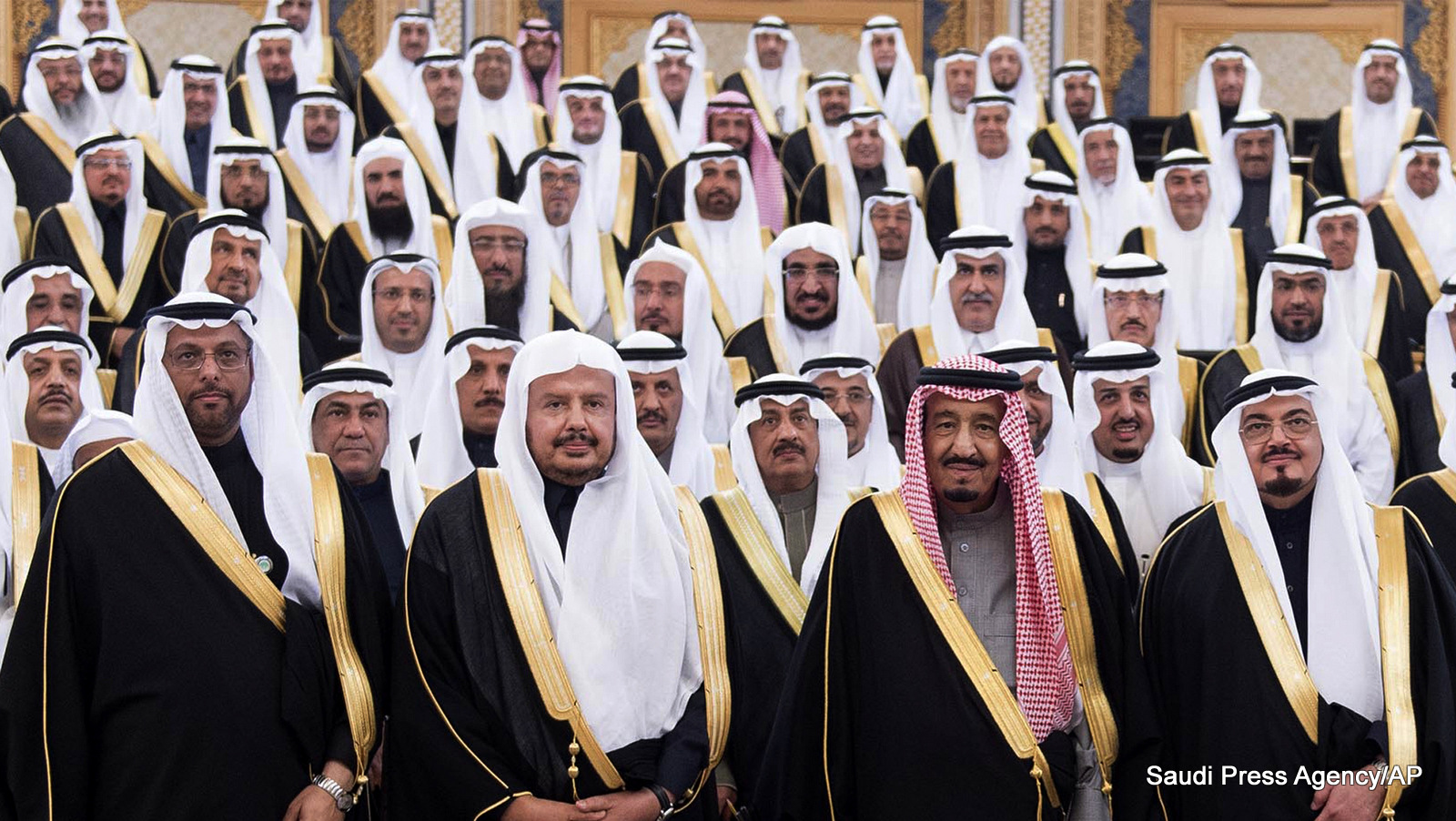
RIYADH, Saudi Arabia — Space studies have established that at the very moment a star stands on the verge of its death, as its core becomes so unstable it starts to self-cannibalize, it begins to expand far beyond its regular size, appearing a giant when it is actually at its weakest and most vulnerable.
Stephen Lendman, a veteran political analyst, acclaimed author and radio host for the Progressive Radio Network, believes this analogy summarizes the precise state in which Saudi Arabia finds itself right now.
Although many may argue the kingdom stands more oppressive and “in control” than ever, strengthened by its trillions in petrodollars and the support of its powerful Western allies, Lendman argues instead that the House of Saud is on the verge of dissolution — “an obsolete power condemned to decrepitude amid a nascent Arab renaissance,” he told MintPress News.
Saudi Arabia broke away from its traditional non-military interventionist policy by declaring an all-out war on Yemen on March 25, while threatening Iran against encroaching further on its “Sunni empire,” Lendman explained. Speaking to MintPress about the kingdom’s surge in hawkish activity on the Arabian Peninsula, he continued:
“Saudi Arabia is not half as strong as it appears … quite the opposite actually. Riyadh’s need to resort to war to keep its empire in check tells me power is waning. The dragon is kicking and thrusting as it can feel power leaving its claws. But ultimately, destruction will come from within the House of Saud. King Salman’s recent government reforms will only act a temporary relief to an already sinking ship.”
Ahmed Mohamed Nasser Ahmed, a Yemeni political analyst and former member of Yemen’s National Issues and Transitional Justice Working Group at the National Dialogue Conference, agrees. Ahmed explains:
“Perceptions can be very deceiving when it comes to Saudi Arabia, especially since Western media have mostly acted as Al Saud’s personal publicists over the decades. Al Saud royals want to project this air of stability and continuity. Any chip in the armor would entail losing Western support, especially U.S. support, and potentially influence in the MENA [Middle East and North Africa]. So of course Al Saud has created this myth around their house. Reality is about to come crashing in, though.”
He continues, noting that the kingdom is “plagued by covert political dissent.”
“Support for the monarchy within the population is at an all-time low and state-engineered sectarian tensions stand to tear at the very fabric of Saudi society, notwithstanding that of the region,” Ahmed said. “When this volcano will erupt, there is no telling how far its fire will spread. It is likely the monarchy will not live to tell the tale.”
Just as Saudi Arabia operated a seemingly smooth transition of power upon the death of King Abdullah in January, King Salman decided to prove his worthiness as a key American ally by implementing a swift reshuffle of the cabinet as well as key positions within the kingdom this April.
Experts have noted that these moves revealed a host of Saudi Arabia’s weaknesses, and could ultimately lead to its unravelling. And while the U.S. is looking at this rise of the next generation of Saudi royalty with glee, since they share common interests in oil, arms sales and counter-terrorism, not all royals are enjoying being shunned from the corridors of power.
Adding to this difficult political balancing act, Salman has to contend with the very monster which has sustained his throne and that of his forefathers by giving the House of Saud religious legitimacy — Wahhabism, an ascetic and repressive interpretation of Islam.
Emboldened by the notion of a “holy war” against all infidels, Saudi Wahhabi legions are becoming more difficult to contain now that the fires of groups like the Islamic State of Iraq and Syria (ISIS) and al-Qaida are burning brighter by the day.
Consolidation of power
“In a complete and sudden break from tradition, King Salman introduced a series of brutal and far-reaching reforms in terms of repartition of power within the various branches of Al Saud family tree,” noted Dr. Akl Kayrouz, a Beirut-based political analyst for the Gulf region, to MintPress.
Kayrouz continued:
“By consolidating his grip on power and promoting his clan over other royal factions, King Salman has antagonized many very powerful Royals, one of which Prince Muqrin, the once designated heir to the throne. It is likely those who have been now sidelined in favor of several of the King’ sons will work to erode the new powerbase. Prince Muqrin has the ears of Sheikh Khalifa bin Zayed Al Nahyan [leader of the United Arab Emirates] … alliances could be formed on the backdrop of regional disputes.”
Upon assuming the crown in late January, Salman, one of the “Sudairi Seven,” positioned his nephew, Prince Mohammed bin Nayef, as deputy crown prince behind Crown Prince Muqrin. While the decree took many by surprise, the appointment met little resistance — at least officially — and America hailed the transition of power a success.
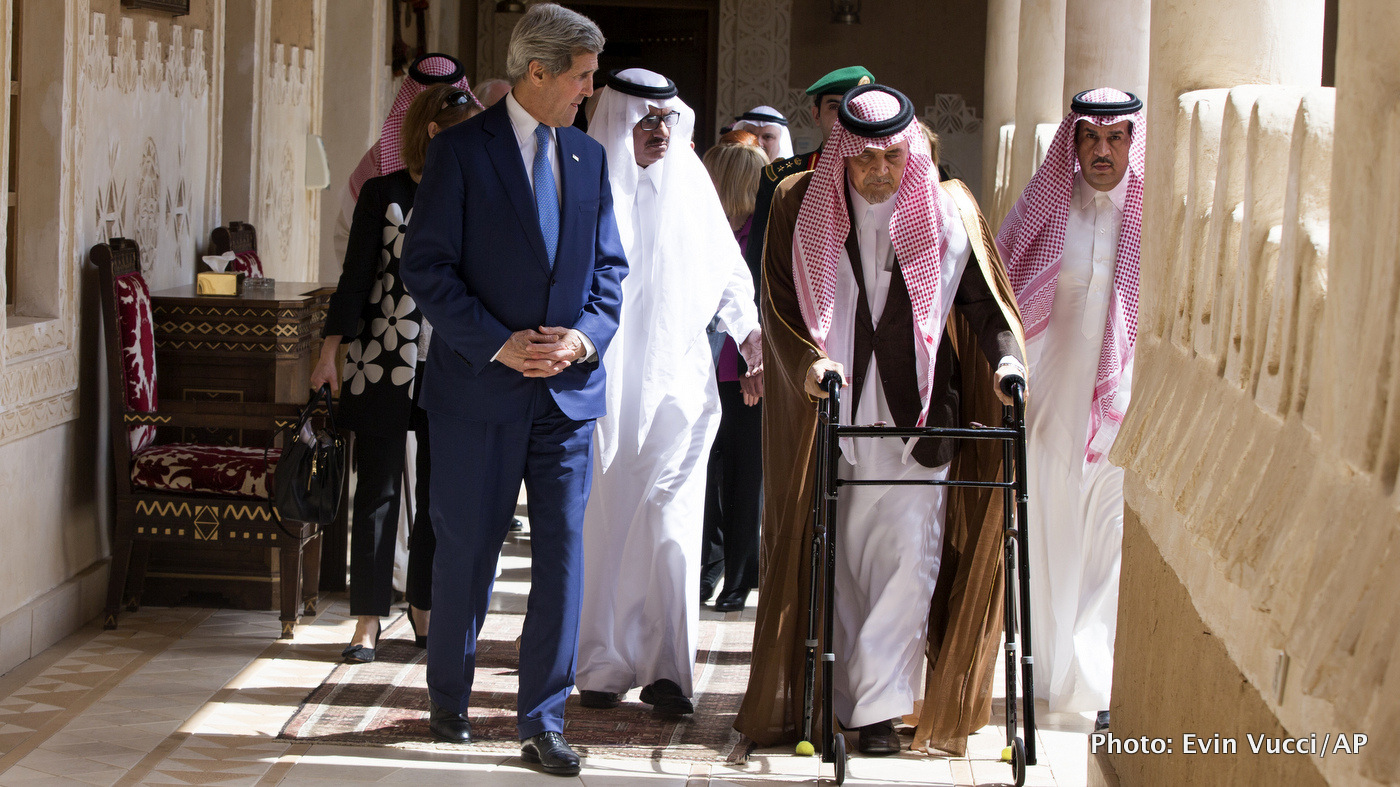
A few months in power and Salman dropped another bombshell by replacing Muqrin, whose appointment as crown prince had been sealed by the late King Abdullah, and nominating Mohammed bin Nayef instead.
A favorite of Washington, Mohammed bin Nayef has long been viewed as a key American ally in the Middle East, especially within the scope of Washington’s counter-terror strategy.
Breaking away from tradition by bringing the third generation of royals closer to the throne, Salman did not stop at the shunning of his half-brother, Muqrin — he secured his own line by appointing his son, Prince Mohammed bin Salman, as deputy crown prince.
“Needless to say, this new trinity of power has left many royals rather sour,” Kayrouz noted.
Still, Salman was not satisfied. In April he also replaced the ailing foreign minister, Prince Saud Al-Faisal, with a non-royal, Adel Al-Jubeir, the serving ambassador to Washington. Prince Saud, foreign minister since 1975, wanted out. Jubeir has been the public spokesman in the U.S. for the Yemeni intervention. His expertise mainly revolves around his knowledge of how U.S. politics and Washington’s bureaucracy work — knowledge the Saudi monarch likely finds most useful as the kingdom vies to keep Iran in check while securing American support.
“If King Salman’s reforms have been welcomed by most Western powers as necessary, most have failed to grasp the ripples those demotions and promotions will have on the monarchial fabric. The kingdom has been weaved on an alliance in between the House of Saud and Wahhabism. Developments could prove that the latter will precipitate the end of the former,” warned Mojtaba Mousavi, an Iranian political analyst and editor in chief of Iran’s View, while speaking to MintPress.
“Nothing screams betrayal louder than bruised ambitions,” he added.
Andrew Bond, a political analyst with the Institute for Gulf Affairs, told MintPress that while Salman’s changes might be fraught with consequences in terms of internal political repercussions, this game of musical chairs actually aims to secure the kingdom’s future.
“King Salman made sweeping changes to guarantee the stability of the monarchy and of course the kingdom for generations to come by transitioning in the younger generation of royals,” Bond said.
He added: “Although many royals are disgruntled, many also understand that change was needed in the great scheme of things.”
The seeds of dissent
With the likes of Muqrin, Prince Mishaal and Prince Turki (Mishaal and Turki are both sons of the late King Abdullah) cut off from the corridors of power, many questions remain unanswered when it comes to the future of Saudi Arabia, arguably the world’s most violent and reactionary theocracy.
Though Prince Mitab, another son of the late king, remains as commander of the Saudi National Guard, whispers in Riyadh suggest that this too is about to change. Indeed, the war in Yemen could serve as an ideal backdrop for the engineered departure of one powerful challenger to Salman’s authority.
The National Guard is the family’s Praetorian Guard. It defends the capital, the holy mosques in Mecca and Medina, and the oil industry. National Guard troops have occupied Bahrain since the Arab Spring in 2011 to keep a minority Sunni monarchy in power. Should the war in Yemen devolve into a ground offensive, it is likely the National Guard will be called into action, leaving much of the fate of the kingdom in Mitab’s hands — that is, unless he is also cut out of the power equation.
But beyond some bruised egos lies Saudi Arabia’s paradox, which is somewhat embodied by Mohammed bin Nayef.
The son of late Crown Prince Nayef, also known as the “Black Prince” for his reactionary ways, Mohammed bin Nayef has been a fierce opponent of al-Qaida while supporting Saudi Arabia’s Wahhabi traditions at home.
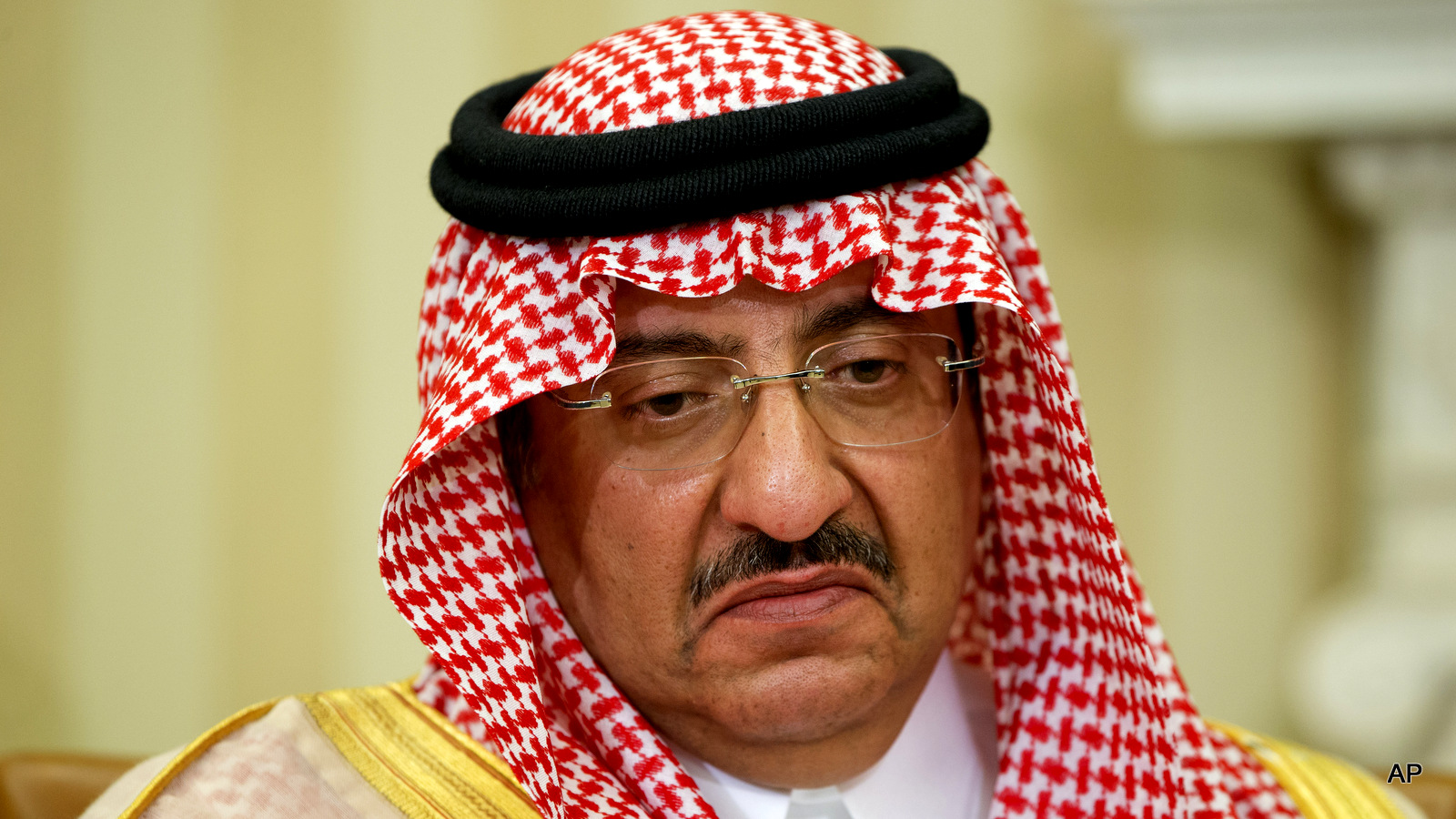
At 55, he’s most famous for defeating al-Qaida’s violent attempt to overthrow the House of Saud a decade ago, when he drove the group’s remnants into the rugged mountains of neighboring Yemen. He’s also survived four assassination attempts. Chairman of the kingdom’s security and political committee, which coordinates security issues, human rights activists have been critical of his role as the nation’s top police officer, while security experts have applauded his counterterrorism efforts.
Mohammed bin Nayef met with President Barack Obama in the Oval Office on Dec. 12, to discuss terrorism and regional issues. At the time, F. Gregory Gause III, a prominent international affairs professor at Texas A&M University, called him “America’s favorite Saudi official.”
“Prince Nayef, very much like his father, is a fierce defender of Saudi Arabia’s tradition and that is Wahhabism. Since it is Wahhabism which has inspired groups like ISIS, we need to ask ourselves how long can the kingdom expect to keep the root of its own radicalism in check,” Mojtaba Mousavi, the political analyst, said.
Catching fire
The May 22 suicide bombing against the Shiite community in Qatif, an eastern province of Saudi Arabia, which ISIS took responsibility for, could be a prelude of what is to come in the kingdom.
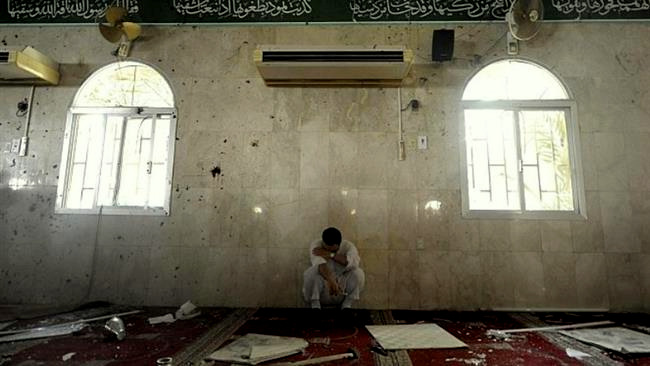
“Qatif’s attack by ISIS needs to be understood as proof that the kingdom is losing control over its religious powerhouse. The throne has relied on Wahhabi clerics for as long as there has been an Al Saud in power. There is a strong co-dependence in between the two,” noted Dr. Kayrouz.
“However,” he added, “a decade of hyper-radicalization and the promotion of sectarianism to serve hegemonic agenda have taken their toll on Saudi Arabia’s already reactionary Wahhabi clergy. Ultra-religious factions within Saudi Arabia would love nothing more but to wage a grand holy war against all infidels — especially Shia Iran.”
Arguing that the attack in Qatif was an attempt to send the kingdom into the throes of a sectarian conflict, Kayrouz believes factions opposed to Salman are exploiting Wahhabis’ frustrations to better destabilize the throne.
Echoing Kayrouz’s assessment, Yemeni political analyst Ahmed Mohamed Nasser Ahmed noted that Yemen could potentially play a pivotal role in the unravelling of the kingdom. He stressed that this is particularly because “the fate of the war has been left in the hands of Prince Mohammed bin Salman [Saudi Arabia’s deputy crown prince and defense minister], an inexperienced figurehead.”
“Prince bin Salman has driven Saudi Arabia into a quagmire in Yemen. And because it is unlikely he will admit defeat, unrest and instability will spread from Yemen upwards, contaminating the Kingdom. How long before ISIS crosses over Yemen northern border?” Ahmed asked.
Andrew Bond, of the Institute for Gulf Affairs, has a more nuanced view of this sectarian flare-up inside Saudi Arabia. He argues the intended target wasn’t the Saudi Shiite community, but actually the authority of Salman.
“You need to understand that King Salman served as defense minister under late King Abdullah, and therefore such attacks on the kingdom’s soil could aim to present the new monarch as a poor leader,” he said.
He added: “Should further attacks occur on the king’s watch then his legitimacy could be in jeopardy, and this I believe is what those attacks are ultimately about.”
Sitting on a powder keg, Saudi Arabia bears many of the characteristics of a revolution in the making: rising poverty and social inequalities; violent police repression; rampant sectarianism and nepotism; latent political dissent; and widespread unpopularity at home.
At this point, the situation is just awaiting the strike of a match.


